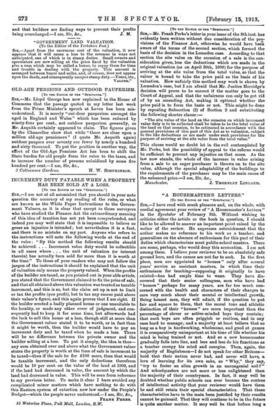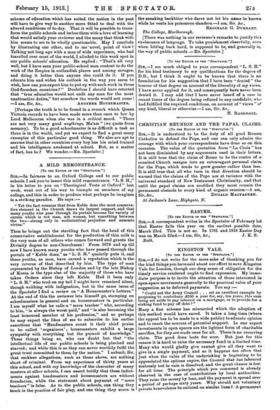"A HOUSEMASTER'S LETTERS."
[To THE EDITOR OP THE "SPECTATOR."] SIR, I have read with much pleasure and, on the whole, with cordial agreement your review of "A Housemaster's Letters" in the Spectator of February 8th. Without wishing to criticize either the article or the book in question, I should like to be allowed to answer an important point raised by the writer of the review. He expresses astonishment that the author makes no reference to his work as a teacher, and generalizes on the absence of enthusiasm for this part of their duties which characterizes most public-school masters. There are some, perhaps, who would deny this accusation. I am not among them. I believe your reviewer to be on absolutely safe ground here, and the causes are not far to seek. In the first place, men are appointed to " houses " only after several years' service as assistant masters, in which time their enthusiasm for teaching—supposing it originally to have existed—has had ample time to wane. They have dis- covered that their senior colleagues, men who have had " houses " perhaps for many years, are far too much con- cerned with the health and characters of their charges to care very much about their mental or intellectual growth. Being honest men, they will admit, if the question be put fair and square to them, that the moral tone and athletic distinction of their "houses" are more important than the percentage of clever or active-minded boys they contain; that such boys are often priggish or restless, and in any case hard to manage; and a majority at least believe that so long as a boy is hardworking, wholesome, and good at games it is comparatively unimportant at his time of life whether his mind is being trained or not. And so a new housemaster gradually falls into line, and less and less do his functions as a teacher occupy his mind and energies. Then, again, the majority of Englishmen—I do not speak for other Britons— hold that their nation never had, and never will have, a love of learning for its own sake, so " Why," they say, " try to foster an alien growth in an uncongenial soil ?" And schoolmasters are not more or less enlightened than the majority of their countrymen. In fact, it may well be doubted whether public schools can ever become the centres of intellectual activity that your reviewer would have them be and still retain their 'special characteristics. That these characteristics have in the main been justified by their results cannot be gainsaid. That they will continue to be in the future is quite another matter. It may well be that before long a scheme of education which has suited the nation in the-past will have to give way to another more fitted to deal with the altered conditions of to-day. That it will be possible to trans- form the public schools and imbue them with a love of learning that would satisfy your reviewer and the many that think with him seems to me to be wholly questionable. May I conclude by illustrating one other, and to me-novel, point of view ? Talking not long ago with a man of wide experience, who had travelled over most of the world, I alluded to this weak spot in our public schools' education. He replied: "That's all very well, but I have seen your public-school man content to do the work of the Empire in outlandish places and among savages, and doing it better than anyone else could do it. If you educate him and widen his outlook in the way you seem to wish, how can you expect him to put up with such work in those God-forsaken countries P" Doubtless I should have retorted that "true education would not unfit any man for the most unattractive duties," but somehow the words would not come!
[Perhaps the truth is to be found in a remark which Queen Victoria records to have been made more than once to her by Lord Melbourne when she was in a critical mood. " There are not very many good anythings, Ma'am" (we quote from memory). To be a good schoolmaster is as difficult a task as there is in the world, and yet we expect to find a great many examples of this particular good thing. We also are apt to assume that in other countries every boy has his mind trained and his intelligence awakened at school. But, as a matter of fact, has he ? We wonder.—ED. Spectator.]











































 Previous page
Previous page